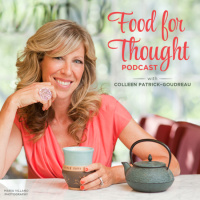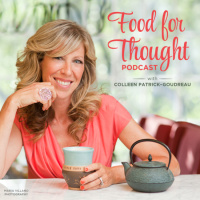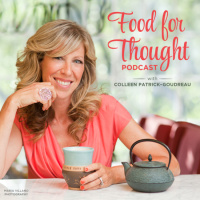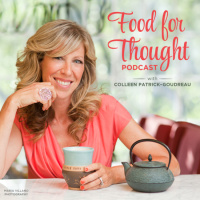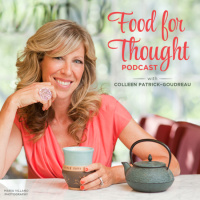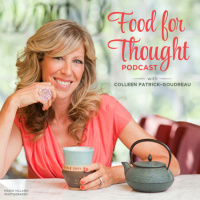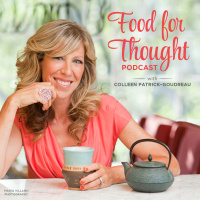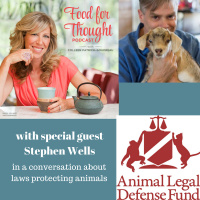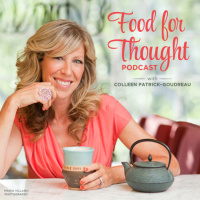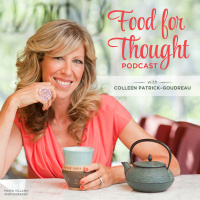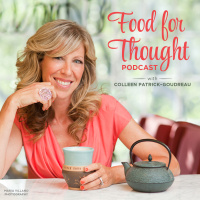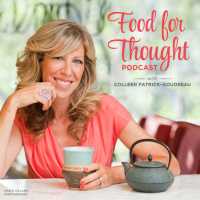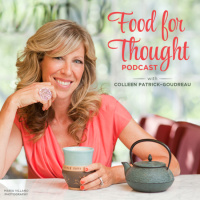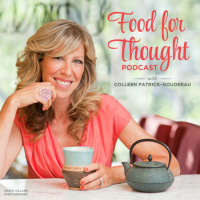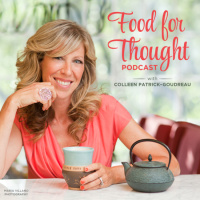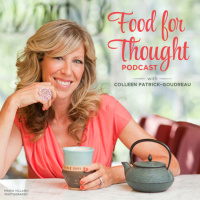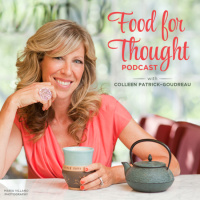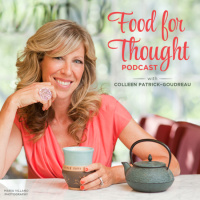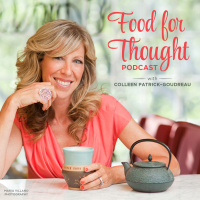Sinopse
Emphasizing the fact that being vegan is a means rather than an end in itself, the Food for Thought podcast addresses all aspects of eating and living compassionately and healthfully. Each episode addresses commonly asked questions about being vegan, including those regarding animal protection, food, cooking, eating, and nutrition — and debunks the myths surrounding these issues. Hosted by bestselling author Colleen Patrick-Goudreau, Food for Thought has been changing lives for over a dozen years. Learn more at ColleenPatrickGoudreau.com.
Episódios
-
10 Habits of Highly Effective Advocates (REBROADCAST)
06/12/2017 Duração: 01h18minAs an advocate for animals and compassionate living for over 25 years, you can imagine I’ve made mistakes, I’ve learned a bit, and I’ve thought a lot about what is effective — and what is not. And so I give you 10 Habits of Highly Effective Advocates. This is a public episode. If you'd like to discuss this with other subscribers or get access to bonus episodes, visit colleenpatrickgoudreau.substack.com/subscribe
-
Co-Existing with Carnivores: A Conversation with Camilla Fox (Project Coyote)
01/12/2017 Duração: 01h14minThe TRUE carnivores of the world provide SO much benefit to our ecosystems, but they're misunderstood, maligned, and systematically killed, mostly because of the HUMANS who pose as carnivores. Animal agriculture doesn't only affect the billions of its direct victims, it also destroys the lives and habitats of millions of individual wild animals. Today’s guest on Food for Thought has devoted her life to changing attitudes and policies about the most maligned members of our communities. Camilla Fox is the founder of Project Coyote, a national nonprofit of scientists, educators, ranchers and citizen leaders who work together to change laws and policies to protect native carnivores from abuse and mismanagement, advocating coexistence instead of killing. Support this podcast today at Patreon.com/ColleenPatrickGoudreau Visit my website: JoyfulVegan.com Join me on an all-inclusive vegan trip: JoyfulVeganTrips.com AFFILIATE PARTNERS: Nama Juicer — Use this link and coupon code COLLEEN10 and get 10% off my favorite
-
How to Talk to a Hunter (Or Anyone Else with Whom You Disagree)
27/11/2017 Duração: 42minWARNING: Radical ideas fill this episode, centering around the suggestion that we try to have compassion for people with whom we disagree or who participate in behavior we find abhorrent. That’s the thing about compassion: it’s gotta be equal opportunity or it’s just inauthentic. It’s easy to be compassionate towards like-minded people; the challenge is choosing to have compassion towards those with whom we disagree. Check out this episode for tips and suggestions on communicating with compassion – but only if you want to create change in the world. Support this podcast today at Patreon.com/ColleenPatrickGoudreau Visit my website: JoyfulVegan.com Join me on an all-inclusive vegan trip: JoyfulVeganTrips.com AFFILIATE PARTNERS: Nama Juicer — Use this link and coupon code COLLEEN10 and get 10% off my favorite juicer. Plaine Products — Use this link and coupon code "compassion" for 15% off my favorite zero waste bath and body products. Complement — Use this link and coupon code "joyfulvegan" and get 10% off my
-
Thanksgiving for the Birds (REBROADCAST)
22/11/2017 Duração: 42minMost people don’t know that our contemporary customs at Thanksgiving, namely the serving of turkeys, were shaped and popularized by a magazine editor, Sarah Josepha Hale, in the mid-1800s. Whatever meaning we attribute to this Thanksgiving holiday is most certainly not lost (in fact, it is enhanced) by creating food-based rituals that affirm rather than take life, that demonstrate compassion and empathy rather than selfishness and gluttony, that celebrate the fact that no one need be sacrificed in order that we should eat. In today’s episode, I offer a number of different menus for a beautiful holiday feast that delights the senses and reflects our values. THANK YOU FOR VOTING 'FOOD FOR THOUGHT' BEST PODCAST IN VEGNEWS MAGAZINE AWARDS AGAIN IN 2017 THANK YOU FOR YOUR SUPPORT: www.Patreon.com/ColleenPatrickGoudreau This is a public episode. If you'd like to discuss this with other subscribers or get access to bonus episodes, visit colleenpatrickgoudreau.substack.com/subscribe
-
Talking Turkey (REBROADCAST)
22/11/2017 Duração: 23minIf you’ve never met them, turkeys are magnificent animals, full of spunk and spark and affection. I’ve introduced many people to the critters at farmed animal sanctuaries, and the animals with whom people have the most transformative experience are the turkeys. Every time. Never fails. Join me as I tell some stories of special turkeys I’ve had the privilege of meeting and as I explain why I’m still making amends to the animals, whose breasts, legs, and wings used to darken my dinner plate. THANK YOU FOR VOTING 'FOOD FOR THOUGHT' BEST PODCAST IN VEGNEWS MAGAZINE AWARDS AGAIN IN 2017 THANK YOU FOR SUPPORTING 'FOOD FOR THOUGHT'. HELP IT GO ANOTHER 13 YEARS: Patreon.com/ColleenPatrickGoudreau This is a public episode. If you'd like to discuss this with other subscribers or get access to bonus episodes, visit colleenpatrickgoudreau.substack.com/subscribe
-
Ethical Tourism: Avoiding Animal Cruelty When Traveling (Thailand Edition)
01/11/2017 Duração: 01h16minA desire to be close to animals compels us to seek out ways to interact with them, but lack of awareness compels us to support industries that exploit and hurt animals for our own entertainment both when we’re at home (like going to the zoo or circus) and when we travel (like swimming with dolphins, getting photographed with tigers, or riding elephants). Our desire to be close to other animals and interact with them is exactly what causes them the most harm. Most of us are drawn to animals, and that’s a good thing, because it also means we want to help them and protect them, but it’s a bad thing when our desire to interact with them is at the cost of their own welfare, safety, happiness, or lives. Listen to today's episode about how to travel to Thailand without harming animals. Support this podcast today at Patreon.com/ColleenPatrickGoudreau Visit my website: JoyfulVegan.com Join me on an all-inclusive vegan trip: JoyfulVeganTrips.com AFFILIATE PARTNERS: Nama Juicer — Use this link and coupon code COLLEEN10
-
Novels Inspired by Animals
07/10/2017 Duração: 42minI discovered an ancient story about justice brought to an abused horse, then found out it was turned into a poem by a well-known American poet in the 19th century. Then I discovered that poem was made into a film by a humane education organization, founded by an ordinary citizen who (after learning about animal abuse) devoted his life to abolishing cruelty to animals. At the same time, he was inspired by a bestselling novel written also by an ordinary citizen concerned about animal abuse; said organization founder sponsored a writing contest for another work of fiction that would highlight animal cruelty for the public, which also became a bestseller. Join me as I share these connections with you to hopefully inspire YOU to use your voice, use your skills, use your gifts to raise awareness, help animals, and inspire others. Support this podcast today at Patreon.com/ColleenPatrickGoudreau Visit my website: JoyfulVegan.com Join me on an all-inclusive vegan trip: JoyfulVeganTrips.com AFFILIATE PARTNERS: Nama Ju
-
Special Episode: Berserk for Bears
22/09/2017 Duração: 40minWe have many words built from the English word for “bear,” the Latin word for “bear,” and the Greek word for “bear,” and we have many expressions and phrases built from the same furry animal. Of course there are also expressions using the verb “to bear,” as in “to carry,” such as in “bearing fruit, bearing a child, or bearing a burden or a grudge. Let’s explore the origins of all of these. This is a public episode. If you'd like to discuss this with other subscribers or get access to bonus episodes, visit colleenpatrickgoudreau.substack.com/subscribe
-
My Client is Innocent: The History and Significance of Protecting Animals Under the Law
06/08/2017 Duração: 01h18minThe first animal anti-cruelty law in the United States was passed in 1867, and though there is much work to be done, much work has been done to protect animals under the law since then. Join me today for my conversation with Stephen Wells, executive director for the Animal Legal Defense Fund, as we talk about the legal definition of animals as "property," legal victories secured for animals, and how this field has grown significantly over the decades, reflecting a shift in public opinion. Visit ALDF.org. Support this podcast today at Patreon.com/ColleenPatrickGoudreau Visit my website: JoyfulVegan.com Join me on an all-inclusive vegan trip: JoyfulVeganTrips.com AFFILIATE PARTNERS: Nama Juicer — Use this link and coupon code COLLEEN10 and get 10% off my favorite juicer. Plaine Products — Use this link and coupon code "compassion" for 15% off my favorite zero waste bath and body products. Complement — Use this link and coupon code "joyfulvegan" and get 10% off my favorite supplements. This is a public epis
-
100-Mile Trek in the Scottish Highlands
26/07/2017 Duração: 01h10minThey said we'd starve being vegan in southern Germany. They said we'd starve being vegan in Rwanda. They said we'd starve in the Highlands. They were wrong, and we lived to tell about it. Join me on our latest excursion — this time on a 100-mile trek from Glasgow to Fort William (and a train ride to Edinburgh). I take you with us from how to pack for such a trip, what my favorite vegan hiking shoes are, what company to use to book with, how to prepare for eating while you're walking 15 miles a day, and how often to stop for whisky. Complete with recommendations, resources, and restaurants. Thanks to listener supporters, who also receive written transcripts of each episode. This is a public episode. If you'd like to discuss this with other subscribers or get access to bonus episodes, visit colleenpatrickgoudreau.substack.com/subscribe
-
Compassion for All Creatures Great and Small: In Conversation with Nancy Lawson, author of The Humane Gardener
17/06/2017 Duração: 01h01minJust because you don't consider yourself a "gardener" doesn't mean this episode isn't for you. Humane gardening is about looking through the lens of the millions of species on this planet and creating a space that enables them to thrive. It's about coexisting with rather than managing or controlling wildlife. With the help of Nancy Lawson, author of The Humane Gardener: Nurturing a Backyard Habitat for Wildlife, you can apply this concept in your own garden patch, on your apartment balcony, or as part of policy you create with city officials. In this episode, Nancy and I chat about: *how to help pollinators (and that doesn't just mean honeybees) *what to do when you have uninvited critters in your attic *how to plant for maximum wildlife (hint: NATIVES!) *why preventing deer, plant-eating animals, from eating plants, makes no sense *why you may want to rethink birdfeeders (and plant natives instead) *how you can prevent your dog from getting skunked -how you can get on the public relations team for wildlife
-
If the World Went Vegan, We Would be Overrun with Animals and Other Hypotheticals
03/06/2017 Duração: 39min“What would happen to all the animals if we stopped eating them? Wouldn’t we be overrun with cows and pigs and chickens if we stopped?” “If everyone stopped eating these animals, they would go extinct. Is that what you want, Ms. Vegan and Mr. Vegan? You don’t care if these animals go extinct??” Join me today as I address these questions. Support this podcast today at Patreon.com/ColleenPatrickGoudreau Visit my website: JoyfulVegan.com Join me on an all-inclusive vegan trip: JoyfulVeganTrips.com AFFILIATE PARTNERS: Nama Juicer — Use this link and coupon code COLLEEN10 and get 10% off my favorite juicer. Plaine Products — Use this link and coupon code "compassion" for 15% off my favorite zero waste bath and body products. Complement — Use this link and coupon code "joyfulvegan" and get 10% off my favorite supplements. This is a public episode. If you'd like to discuss this with other subscribers or get access to bonus episodes, visit colleenpatrickgoudreau.substack.com/subscribe
-
Laws for Animals: Effective Political Activism
28/04/2017 Duração: 47minI believe that shifting the way we talk about, think about, and behave towards other animals will impact them positively in the long term. But I also believe that as people who care about animals, we need to be politically engaged, because it’s not enough to change hearts and minds; we also have to change laws in order to protect animals from violence and exploitation. If you're looking to become empowered and emboldened to be a voice for animals, this is the episode for you. Support this podcast today at Patreon.com/ColleenPatrickGoudreau Visit my website: JoyfulVegan.com Join me on an all-inclusive vegan trip: JoyfulVeganTrips.com AFFILIATE PARTNERS: Nama Juicer — Use this link and coupon code COLLEEN10 and get 10% off my favorite juicer. Plaine Products — Use this link and coupon code "compassion" for 15% off my favorite zero waste bath and body products. Complement — Use this link and coupon code "joyfulvegan" and get 10% off my favorite supplements. This is a public episode. If you'd like to discuss t
-
SPECIAL EPISODE: Old English Pigs and Old French Pork
11/04/2017 Duração: 15minResearch has found that the way we name animals is intimately tied to our ability to eat them. Listen to this excerpt, then head over to Animalogy for the full episode. This topic is relevant for Food for Thought listeners, so I thought I'd put it on your radar. Subscribe to Animalogy Podcast wherever you listen to podcasts. Thank you! This is a public episode. If you'd like to discuss this with other subscribers or get access to bonus episodes, visit colleenpatrickgoudreau.substack.com/subscribe
-
Vegan in Africa: Animals, Food, and Nature in Four Countries
14/03/2017 Duração: 01h18minHaving been to Rwanda, Botswana, Zimbabwe, and South Africa, I can now share with you the details of our adventure. For information on what you need to do before visiting these countries, check out the Food for Thought episode called Planning and Preparing a Trip to Africa. But for what do to once you get there and how to make the most of it, sit back, and enjoy the journey. Supporters of Food for Thought receive the itinerary and specific details of the trip. This is a public episode. If you'd like to discuss this with other subscribers or get access to bonus episodes, visit colleenpatrickgoudreau.substack.com/subscribe
-
SPECIAL EPISODE -- The Semantics of Meat (with Paul Shapiro)
20/02/2017 Duração: 46minEasing you into the new ANIMALOGY podcast, enjoy this SPECIAL episode, and be sure to subscribe to ANIMALOGY today on iTunes or wherever you listen to podcasts. Semantics play a significant role in shaping public perception about animals and animal welfare. The meat, dairy, and egg industries go to great lengths to remove harsh terminology and replace it with euphemisms that conceal the truth and sanitize violence. In today’s episode, I talk to someone who knows this all too well: Paul Shapiro, Vice President of Policy at The Humane Society of the United States. Join us as we discuss euphemisms and doublespeak used by animal agriculture and the best terms for plant-based and cultured meat. Please subscribe to Animalogy on iTunes and Stitcher, download the episodes, and leave a review. Thank you for helping change the way we talk — and think — about animals. This is a public episode. If you'd like to discuss this with other subscribers or get access to bonus episodes, visit colleenpatrickgoudreau.substack.c
-
11-Year Anniversary: Another Amazing Love Fest!
01/02/2017 Duração: 01h58minHelp celebrate the ELEVEN-YEAR ANNIVERSARY of the Food for Thought podcast by sitting back and taking in the love letters I’ve received from listeners and supporters this past year. The stories are as diverse as the listeners and reflect varied ages and backgrounds, but they all share common threads of hope, transformation, and compassion. I hope you are as moved by the letters as I am humbled by them. If you ever once thought that “people don’t change,” then you’re in for quite a treat. And grab some tea or a glass of wine. Support this podcast today at Patreon.com/ColleenPatrickGoudreau Visit my website: JoyfulVegan.com Join me on an all-inclusive vegan trip: JoyfulVeganTrips.com AFFILIATE PARTNERS: Nama Juicer — Use this link and coupon code COLLEEN10 and get 10% off my favorite juicer. Plaine Products — Use this link and coupon code "compassion" for 15% off my favorite zero waste bath and body products. Complement — Use this link and coupon code "joyfulvegan" and get 10% off my favorite supplements. T
-
SPECIAL EPISODE — Eating Crow? Trying Eating Humble Pie Instead.
23/01/2017 Duração: 19minEasing you into the new podcast, enjoy this episode of ANIMALOGY, and be sure to subscribe to ANIMALOGY today on iTunes or wherever you listen to podcasts. If you’ve made a serious faux pas and need to acknowledge it with humility, you might be said to be “eating crow” or “eating humble pie,” both phrases of which involve animals — or do they? In this episode, I uncover the dirty little secret underneath the pastry dough in “to eat humble pie” but demonstrate why you still want to eat humble pie (or dirt) instead of crows. Please subscribe to Animalogy on iTunes and Stitcher, download the episodes, and leave a review. Thank you for helping change the way we talk — and think — about animals. This is a public episode. If you'd like to discuss this with other subscribers or get access to bonus episodes, visit colleenpatrickgoudreau.substack.com/subscribe
-
SPECIAL EPISODE — Zodiac: A Circle of Animals (Literally)
23/01/2017 Duração: 50minEasing you into our new podcast, enjoy this episode of ANIMALOGY, and be sure to subscribe to ANIMALOGY today on iTunes or wherever you listen to podcasts. Of the 88 constellations officially recognized by Western astronomy, 40 of them are named after animals — 43 if you count the mythical animals. We’re going to talk about 12 of them today — the 12 that make up the zodiac from Western astrology — ALL of which contain animals. After all, the word zodiac is Greek for “circle of little animals.” FIVE THINGS YOU CAN DO FOR ANIMALOGY: 1.Subscribe to Animalogy on iTunes and Stitcher and download the episodes. 2. Leave a 5-star rating on iTunes. 3. Leave a review on iTunes. High ratings, reviews, and downloads in the first month increase the chances of high placement on iTunes. 4. Become a monthly supporter of the podcast. For just .33 cents a day, you receive transcripts to each episode; for $1.00 a day, you get bonus episodes. Your support helps us reach the goal of making it a weekly, ad-free show. 5. Share t
-
SPECIAL EPISODE — Coccyx: Please Don't Sit on the Cuckoo
11/01/2017 Duração: 07minEasing you into the new podcast, enjoy this episode from ANIMALOGY, and be sure to subscribe to ANIMALOGY today! Coccyx is a small triangle-shaped bone at the base of the spinal column in humans and other apes, such as gibbons, orangutans, gorillas, and chimpanzees. Representing a vestigial tail and most commonly called the tailbone, coccyx was the name given to this part of our anatomy by ancient Greek physician Galen because of its resemblance to an animal, making the word an "animalogy." Can you guess the etymology? All is revealed in this episode of Animalogy, a podcast about language and the animal-related words and expressions we use every day. This is a public episode. If you'd like to discuss this with other subscribers or get access to bonus episodes, visit colleenpatrickgoudreau.substack.com/subscribe

